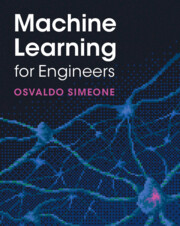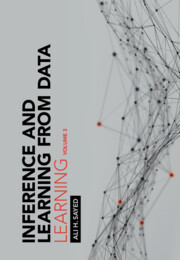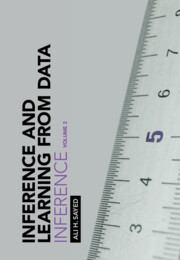Introduction to Machine Learning
Emphasizing how and why machine learning algorithms work, this introductory textbook bridges the gap between the theoretical foundations of machine learning and its practical algorithmic and code-level implementation. Over 85 thorough worked examples, in both Matlab and Python, demonstrate how algorithms are implemented and applied whilst illustrating the end result. Over 75 end-of-chapter problems empower students to develop their own code to implement these algorithms, equipping them with hands-on experience. Matlab coding examples demonstrate how a mathematical idea is converted from equations to code, and provide a jumping off point for students, supported by in-depth coverage of essential mathematics including multivariable calculus, linear algebra, probability and statistics, numerical methods, and optimization. Accompanied online by instructor lecture slides, downloadable Python code and additional appendices, this is an excellent introduction to machine learning for senior undergraduate and graduate students in Engineering and Computer Science.
- A self-contained textbook, containing all the necessary background information as well as key machine learning topics in the same volume
- Encourages students to understand how to translate mathematical ideas into code implementation, enhancing understanding of the inner workings of machine learning algorithms
- Examples are developed without the need to rely on existing libraries or software
Product details
July 2025Hardback
9781316519509
668 pages
254 × 178 mm
Not yet published - available from July 2025
Table of Contents
- Part I. Mathematical Foundations:
- 1. Solving Equations
- 2. Unconstrained Optimization
- 3. Constrained Optimization
- Part II. Regression:
- 4. Bias-Variance Tradeoff and Overfitting vs Underfitting
- 5. Linear Regression
- 6. Nonlinear Regression
- 7. Logistic and Softmax Regression
- 8. Gaussian Process Regression and Classification
- Part III. Feature Extraction:
- 9. Feature Selection
- 10. Principal Component Analysis
- 11. Variations of PCA
- 12. Independent Component Analysis
- Part IV. Classification:
- 13. Statistic Classification
- 14. Support Vector machine
- 15. Clustering Analysis
- 16. Hierarchical Classifiers
- 17. Biologically Inspired Networks
- 18. Perceptron-Based Networks
- 19. Competition-Based Networks
- Part VI. Reinforcement Learning:
- 20. Introduction to Reinforcement Learning.






